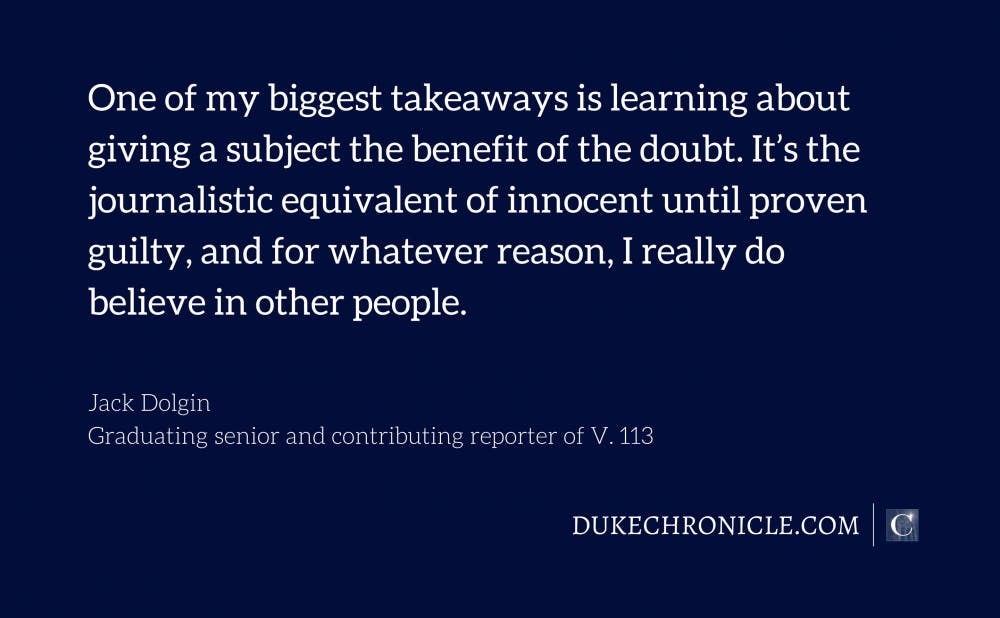If there’s a reason I’ve contributed as much as I have to The Chronicle in four years, it’s because of a desire for truth. I think we reporters serve a real purpose in bringing topics to light that deserve the light—I have proudly seen my friends write about sexual harassment, Tallman Trask and even Pitchforks at its prime hour, 2 a.m. on a Sunday.
One of my biggest takeaways is learning about giving a subject the benefit of the doubt. It’s the journalistic equivalent of innocent until proven guilty, and for whatever reason, I really do believe in other people. I really do believe many of us have good intentions, and often we are blinded from seeing the full picture when we are angry at someone else.
I held a slight grievance against one administrator at Duke for a mean email they sent one of my fellow graduating senior writers after a story. I thought it was terse, and I didn’t consider that maybe that administrator was pressed for time with a bunch of other things on their plate.
I was reminded of how I had forgotten to give that person the benefit of the doubt when I met with them for a story and was struck by their candor—I can be cynical about administrators because my job is to shed a critical light on the university, but I was heartened by how it really seemed this administrator really cared about students. I sometimes forget how easy it is to just blame the school for things I don’t like.
But the people we interview do not always do themselves favors. In my time at Duke, I have focused mostly on the athletic department, and though this may not be Duke-specific, I’ve seen significantly different attitudes between revenue and non-revenue coaches.
I remember idolizing Mike Krzyzewski before I ever had braces on my teeth. And I remember my first press conference covering the men’s basketball team, in which I asked perhaps a stupid question about who the team’s point guard would be that year.
But there was no reason Krzyzewski had to make fun of me for my question with obnoxious sarcasm. In fact, he has a tendency to do as much with young reporters, though again, that applies to other college basketball coaches too.
The other revenue coaches have also picked on us. Joanne P. McCallie, the women’s basketball coach, alleged outgoing sports editor Hank Tucker misquoted her when he certainly did not, and David Cutcliffe chose to go off on the only tirade I can remember when my fellow Chronicle writer asked a very legitimate question, if he considered benching Daniel Jones after four first-half interceptions. (GoDuke.com edited out the tirade from the post-game press conference).
I don’t think this attitude toward student journalists is as much a reflection of coaches’ characters as just the power dynamic—it’s seen even with professional reporters. The News & Observer beat writer never interacted with us, much less complimented our work, even though she wrote for The Chronicle only a few years earlier.
The one interaction I had with her was her condescendingly laughing at a question I asked. Likewise, I didn’t appreciate the paper’s sports columnist interrupting my questions to Grayson Allen, and then reeling off five straight questions, when I had clearly been talking to Allen first.
Fortunately, I really don’t think it has to be this way. Non-revenue teams are Exhibit A.
Faced with his toughest career loss, the Duke women’s soccer coach Robbie Church was gracious to me after I pressed him on his tactical choices. He went up to me after the press conference, thanked for me covering the team for two years and shook my hand. The local beat writer Kip Coons was equally friendly.
Like I said before, I trust that people at Duke want the school to be its best, including revenue sports coaches. But unfortunately no one is perfect, including reporters. So if you’re upset that you’re covering isn’t peppier—though we always do strive for the truth—maybe write nicer emails back to student journalists, publish data and certainly don’t retract it, and make an effort to meet with us for interviews rather than just communicating via email or turning us down?
In other words, make it easy for us to give you benefit of the doubt. It’s a win-win.
Again, like every reporter, I haven’t been perfect either. Hopefully I’ll remember to hold up my end of the bargain going forward (in life, that is) and give benefit of the doubt before settling on the truth.
Jack Dolgin is a Trinity senior and former sports associate editor for The Chronicle. He’d like to thank his sports editors over the years, particularly Ryan Hoerger, Amrith Ramkumar and Hank Tucker, for being terrific mentors and incredibly generous with giving out responsibilities. He also wants to thank The Chronicle’s members, readers and contributors for an unforgettable four years. Finally, he wants to note that when we write a good story we, the authors, get the credit rather than the sources—so he thanks everyone whom he’s gotten to interview. He hopes he’s made their time investment and trust worth it.
Get The Chronicle straight to your inbox
Sign up for our weekly newsletter. Cancel at any time.

